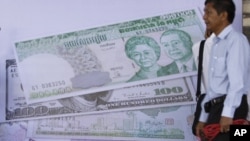PHNOM PENH - Since the public opening of the security exchange in Cambodia in 2011, progress has been slow. Not everyone knows about the exchange, and not everyone can afford to invest.
There are only about 3,700 accounts at the exchange, and still only 12 companies trading there. A third of the accounts are foreign. Currently, the Phnom Penh Security Exhcange building remains quiet, with only about 2,000 shares traded.
Sun Sokhet, a broker there, says the idea of the stock exchange is still new, which makes it difficult for people to invest.
“Unlike people in developed countries, Cambodians, with restricted knowledge, are reluctant to invest their money in something they have never experienced before,” he said. “And some people even compare investing money in the stock exchange to playing a game.”
To invest in the exchange, a potential investor must register his or her name and open an account, which costs around $5. But that’s not something everyone can afford.
Phon Sophat, a private driver for the Raffles Hotel, told VOA Khmer that with his wages investing his money in the exchange is not possible.
But stocks are not completely unaffordable. In August, the highest-priced stock was about $2.50 a share, and the lowest was close to $1.25.
Leing Borey, 23, a student in information technology, said, like many people, his knowledge of the exchange is limited. He’d heard some information about it on the radio and TV, he said. “However, I don’t really know how exactly it is working or progressing.”
The Cambodian government owns 55 percent of the exchange; the rest is owned by a South Korean company. Only one government company, the Phnom Penh Water Supply, is trading shares. It has around 89 million shares for sale.
Neou Seiha, an economic analyst, said it will be hard to convince Cambodians to invest their money for now, but in the future, the exchange is likely to grow.
Lamun Soleil, deputy director of the market’s operation department, said the stock exchange is new to Cambodians. But he said he was optimistic about its future.
“A stock exchange plays a vital role in economic development, since it will help Cambodian people who don’t have a budget to open a new business,” he said. “It gives people options to consider.”
There are only about 3,700 accounts at the exchange, and still only 12 companies trading there. A third of the accounts are foreign. Currently, the Phnom Penh Security Exhcange building remains quiet, with only about 2,000 shares traded.
Sun Sokhet, a broker there, says the idea of the stock exchange is still new, which makes it difficult for people to invest.
“Unlike people in developed countries, Cambodians, with restricted knowledge, are reluctant to invest their money in something they have never experienced before,” he said. “And some people even compare investing money in the stock exchange to playing a game.”
To invest in the exchange, a potential investor must register his or her name and open an account, which costs around $5. But that’s not something everyone can afford.
Phon Sophat, a private driver for the Raffles Hotel, told VOA Khmer that with his wages investing his money in the exchange is not possible.
But stocks are not completely unaffordable. In August, the highest-priced stock was about $2.50 a share, and the lowest was close to $1.25.
Leing Borey, 23, a student in information technology, said, like many people, his knowledge of the exchange is limited. He’d heard some information about it on the radio and TV, he said. “However, I don’t really know how exactly it is working or progressing.”
The Cambodian government owns 55 percent of the exchange; the rest is owned by a South Korean company. Only one government company, the Phnom Penh Water Supply, is trading shares. It has around 89 million shares for sale.
Neou Seiha, an economic analyst, said it will be hard to convince Cambodians to invest their money for now, but in the future, the exchange is likely to grow.
Lamun Soleil, deputy director of the market’s operation department, said the stock exchange is new to Cambodians. But he said he was optimistic about its future.
“A stock exchange plays a vital role in economic development, since it will help Cambodian people who don’t have a budget to open a new business,” he said. “It gives people options to consider.”







